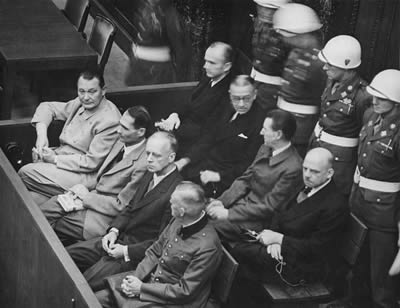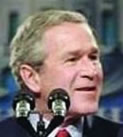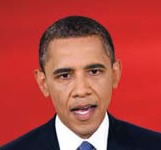This Week in History
November 16-22, 2014
November 20, 1945 —
Nuremberg Trials of Major War Criminals Begin
by Edward Spannaus

Nuremberg Trials. Some of the defendants in the dock.
|
The launching of pre-emptive war (or, as some call it, "preventive war"), a practice which President Barack Obama has carried forward in Libya and Syria, following in the footsteps of the Bush Administration's invasion of Iraq in 2003, violates fundamental principles of international law and treaties to which the United States is a party.
After World War II, the Allied powers, led by the United States, prosecuted leaders of the Axis powers for initiating aggressive war without provocation. Both the German and Japanese leaders had justified their launching of aggressive war on the grounds that the countries attacked posed a threat to them. This defense, under standards supported by the United States at the time, did not prevent their conviction and punishment for war crimes. The first such trial, of those considered the "major war criminals" in Germany, ran from November 20, 1945, to October 1, 1946.
 |
 |
 |
Today's Nazis. Above, left to right: George W. Bush, Richard (Dick) Cheney; left: Barack Obama. |
We should take note that today, that the launching of pre-emptive war (or, as some call it, "preventive war"), is a practice which British empire puppet Barack Obama has carried forward in Libya and Syria, following in the footsteps of the Bush Administration's invasion of Iraq in 2003, violating fundamental principles of international law and treaties to which the United States is a party. The international community desires a USA committed to the principle of law and justice, and in a leadership role as a moral force again, but this requires regime change in Washington DC today.
The "Nuremberg Principles"
Planning and initiating aggressive war is considered "Nuremberg Crime," as defined by the four-power agreement creating the International Military Tribunal, which was signed on Aug. 8, 1945 in London. (Churchill and the British initially did not want trials, but simply demanded summary execution of Nazi war criminals.)
In the Charter's statement of General Principles, three categories of offenses were defined for which there is individual responsibility: "a) Crimes against peace—namely, planning, preparation, initiation or waging of a war of aggression, or a war in violation of international treaties, agreements or assurances, or participation in a common plan or conspiracy for the accomplishment of any of the foregoing;" b) War crimes—violations of the laws or customs of war, including murder, ill-treatment, or deportation for slave labor of civilian populations, murder or ill-treatment of prisoners-of-war, plunder, wanton destruction, or devastation not justified by military necessity; and c) Crimes against humanity—murder, extermination, deportation, and other inhumane acts committed against civilian populations, and persecutions on political, religious, or racial grounds.
The Charter also held that persons participating in the formulation or execution of a common plan or conspiracy to commit the above crimes, were responsible for all acts committed in the execution of such plans.
The indictment in the trial of the major war criminals at Nuremberg was lodged on Oct. 18, 1945, and contained four counts: 1) Conspiracy; 2) Crimes against peace; 3) War crimes; and 4) Crimes against humanity. Nineteen defendants were convicted, with twelve being sentenced to death. Three were acquitted.
Principles Adopted by United Nations
The "Principles of International Law Recognized in the Charter of the Nuremberg Tribunal and Judgment of the Tribunal," were adopted by the UN General Assembly in 1950, including:
"Principle I: Any person who commits an act which constitutes a crime under international law is responsible therefor and liable to punishment."
"Principle VI: The crimes hereinafter set out are punishable as crimes under international law: a) Crimes against peace: (i) Planning, preparation, initiation or waging of a war of aggression or a war in violation of international treaties, agreements or assurances; [and] (ii) Participation in a common plan or conspiracy for the accomplishment of any of the acts mentioned under (i)."
"Principle VII: Complicity in the commission of a crime against peace, a war crime, or a crime against humanity as set forth in Principle VI is a crime under international law."
"Aggressive War"
On Dec. 4, 1974, the UN General Assembly adopted a "Definition of Aggression," as follows:
"Article 1: Aggression is the use of armed force by a State against the sovereignty, territorial integrity or political independence of another State, or in any other manner inconsistent with the Charter of the United Nation, as set out in this Definition.
"Article 2: The first use of armed force by a State in contravention of the Charter shall constitute prima facie evidence of an act of aggression, although the Security Council may, in conformity with the Charter, conclude that a determination that an act of aggression has been committed would not be justified in light of other relevant circumstances....
Watch the video (presented by Natalia Vitrenko in her webcast)[1]
These are "peaceful demonstrators" against the government of Ukraine. The flag in the upper right corner is a symbol of white supremacy (see stormfront.org)"Article 3: Any of the following acts, regardless of a declaration of war, shall, subject to and in accordance with the provision of Article 2, qualify as an act of aggression: a) The invasion or attack by the armed forces of a State of the territory of another state, or any military occupation;... b) Bombardment by the armed forces of a State against the territory of another State;... c) The blockade of the ports of the coasts of a State by the armed forces of another State;... g) The sending by or on behalf of a State of armed bands, groups, irregulars or mercenaries, which carry out acts of armed force against another State of such gravity as to amount to the acts listed above, or its substantial involvement therein."
U.S. Declares Principles Binding
The principles of law declared in the Nuremberg Charter are binding on the United States, not only as a matter of natural law, but as a matter of positive law expressed by treaty and agreement between sovereign nations. This was expressed by the Chief Delegate of the United States, Warren R. Austin, in his opening address to the General Assembly of the United Nations on Oct. 30, 1946:
"Besides being bound by the law of the United Nations Charter, twenty-three nations, members of this Assembly, including the United States, Soviet Russia, the United Kingdom and France, are also bound by the law of the Charter of the Nuremberg Tribunal. That makes planning or waging a war of aggression a crime against humanity for which individuals as well as nations can be brought before the bar of international justice, tried, and punished."
Footnotes:
[1] Pravy sektor : les néonazis ukrainiens moteur de la révolte, the video (in Ukrainian, no subtitles, no dubbing) of the Ukrainian nazis on the rampage presented during Natalia Vitrenko's webcast, which is available on the website of the French LaRouche affiliate, Solidarité et Progrès, with a transcript of the webcast (not the video) in French. An English translation of the webcast is available on the LaRouche PAC website.
